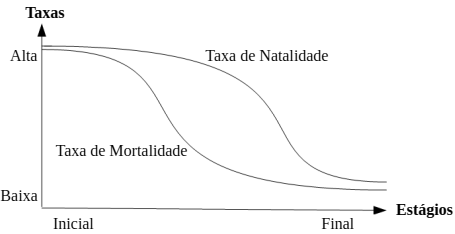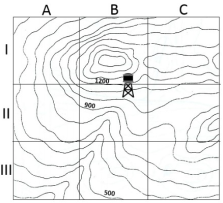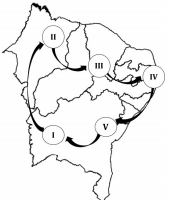Questões Militares
Comentadas para exército
Foram encontradas 4.974 questões
Resolva questões gratuitamente!
Junte-se a mais de 4 milhões de concurseiros!
Chinese Woman Opens Plane’s Emergency Exit for Some Fresh Air
A flight was delayed for an hour and a woman detained by police after she opened the emergency exit for “a breath of fresh air” before the flight took off in central China’s Hubei province, mainland media reported. The incident happened on Xiamen Air Flight MF8215 from Wuhan to Lanzhou, which was scheduled to take off at 3.45 p.m. on September 23.
Cabin crew had briefed the woman, who was in her 50s, about the rules when sitting next to the emergency exit and reminded her not to touch the button that opened the emergency exit. However, the woman said she needed some fresh air and touched the button to open the exit when the stewardess turned around to help others, the report said. The woman was taken away and the flight was delayed for an hour. Opening the emergency exit can be considered to be disturbing public order in an aircraft, which is punishable by police detention and a fine.
In July last year, a woman who was flying for the first time mistook the emergency door for a lavatory door before her plane took off in Nanjing. The emergency slide was released and the flight was delayed for two hours. The woman was detained for 10 days. Some passengers have paid a heavy price for releasing the emergency slide, which may take days and considerable expense to repair and reinstall. In January 2015, a man who opened an emergency door after a plane landed in Chongqing had to pay 35,000 yuan (150,000 baht) in compensation to the airline.
In June, a man from Hubei who was returning to China from Bangkok on a Thai Lion Air Flight opened an emergency exit before take-off. After apologising repeatedly, according to witnesses, he was held by Thai authorities for one day and given a fine of 500 baht before being deported.
Adapted from https://www.bangkokpost.com/world/1762629/chinese-woman-opens-planes-emergency-exit-for-somefresh-air
Chinese Woman Opens Plane’s Emergency Exit for Some Fresh Air
A flight was delayed for an hour and a woman detained by police after she opened the emergency exit for “a breath of fresh air” before the flight took off in central China’s Hubei province, mainland media reported. The incident happened on Xiamen Air Flight MF8215 from Wuhan to Lanzhou, which was scheduled to take off at 3.45 p.m. on September 23.
Cabin crew had briefed the woman, who was in her 50s, about the rules when sitting next to the emergency exit and reminded her not to touch the button that opened the emergency exit. However, the woman said she needed some fresh air and touched the button to open the exit when the stewardess turned around to help others, the report said. The woman was taken away and the flight was delayed for an hour. Opening the emergency exit can be considered to be disturbing public order in an aircraft, which is punishable by police detention and a fine.
In July last year, a woman who was flying for the first time mistook the emergency door for a lavatory door before her plane took off in Nanjing. The emergency slide was released and the flight was delayed for two hours. The woman was detained for 10 days. Some passengers have paid a heavy price for releasing the emergency slide, which may take days and considerable expense to repair and reinstall. In January 2015, a man who opened an emergency door after a plane landed in Chongqing had to pay 35,000 yuan (150,000 baht) in compensation to the airline.
In June, a man from Hubei who was returning to China from Bangkok on a Thai Lion Air Flight opened an emergency exit before take-off. After apologising repeatedly, according to witnesses, he was held by Thai authorities for one day and given a fine of 500 baht before being deported.
Adapted from https://www.bangkokpost.com/world/1762629/chinese-woman-opens-planes-emergency-exit-for-somefresh-air
Chinese Woman Opens Plane’s Emergency Exit for Some Fresh Air
A flight was delayed for an hour and a woman detained by police after she opened the emergency exit for “a breath of fresh air” before the flight took off in central China’s Hubei province, mainland media reported. The incident happened on Xiamen Air Flight MF8215 from Wuhan to Lanzhou, which was scheduled to take off at 3.45 p.m. on September 23.
Cabin crew had briefed the woman, who was in her 50s, about the rules when sitting next to the emergency exit and reminded her not to touch the button that opened the emergency exit. However, the woman said she needed some fresh air and touched the button to open the exit when the stewardess turned around to help others, the report said. The woman was taken away and the flight was delayed for an hour. Opening the emergency exit can be considered to be disturbing public order in an aircraft, which is punishable by police detention and a fine.
In July last year, a woman who was flying for the first time mistook the emergency door for a lavatory door before her plane took off in Nanjing. The emergency slide was released and the flight was delayed for two hours. The woman was detained for 10 days. Some passengers have paid a heavy price for releasing the emergency slide, which may take days and considerable expense to repair and reinstall. In January 2015, a man who opened an emergency door after a plane landed in Chongqing had to pay 35,000 yuan (150,000 baht) in compensation to the airline.
In June, a man from Hubei who was returning to China from Bangkok on a Thai Lion Air Flight opened an emergency exit before take-off. After apologising repeatedly, according to witnesses, he was held by Thai authorities for one day and given a fine of 500 baht before being deported.
Adapted from https://www.bangkokpost.com/world/1762629/chinese-woman-opens-planes-emergency-exit-for-somefresh-air
Lockdown Named 2020’s Word of the Year by Collins Dictionary
Lockdown, the noun that has come to define so many lives across the world in 2020, has been
named word of the year by Collins Dictionary. Lockdown is defined by Collins as “the imposition of stringent
restrictions on travel, social interaction, and access to public spaces”. The 4.5-billion-word Collins Corpus,
which contains written material from websites, books and newspapers, as well as spoken material from
radio, television and conversations, registered a 6,000% increase in ______(1) usage. In 2019, there were
4,000 recorded instances of lockdown being used. In 2020, this had risen to more than a quarter of a
million.
“Language is a reflection of the world around us and 2020 has been dominated by the global pandemic,” says Collins language content consultant Helen Newstead. “We have chosen lockdown as _______(2) word of the year because it encapsulates the shared experience of billions of people who have had to restrict _______(3) daily lives in order to contain the virus. Lockdown has affected the way we work, study, shop, and socialise. It is not a word of the year to celebrate, but it is, perhaps, one that sums up the year for most of the world.”
Other pandemic-related words such as coronavirus, social distancing and key worker were on the dictionary’s list of the top 10 words. However, the coronavirus crisis didn’t completely dominate this year’s vocabulary: words like “Megxit,” a term to describe Prince Harry and Meghan Markle stepping back as senior members of the royal family, also made the shortlist along with “TikToker” (a person who regularly shares or appears in videos on TikTok), and “BLM.” The abbreviation BLM, for Black Lives Matter is defined by Collins as “a movement that campaigns against racially motivated violence and oppression”, it registered a 581% increase in usage.
Adapted from https://www.theguardian.com/books/2020/nov/10/lockdown-named-word-of-the-year-by-collins-dictionary
Lockdown Named 2020’s Word of the Year by Collins Dictionary
Lockdown, the noun that has come to define so many lives across the world in 2020, has been
named word of the year by Collins Dictionary. Lockdown is defined by Collins as “the imposition of stringent
restrictions on travel, social interaction, and access to public spaces”. The 4.5-billion-word Collins Corpus,
which contains written material from websites, books and newspapers, as well as spoken material from
radio, television and conversations, registered a 6,000% increase in ______(1) usage. In 2019, there were
4,000 recorded instances of lockdown being used. In 2020, this had risen to more than a quarter of a
million.
“Language is a reflection of the world around us and 2020 has been dominated by the global pandemic,” says Collins language content consultant Helen Newstead. “We have chosen lockdown as _______(2) word of the year because it encapsulates the shared experience of billions of people who have had to restrict _______(3) daily lives in order to contain the virus. Lockdown has affected the way we work, study, shop, and socialise. It is not a word of the year to celebrate, but it is, perhaps, one that sums up the year for most of the world.”
Other pandemic-related words such as coronavirus, social distancing and key worker were on the dictionary’s list of the top 10 words. However, the coronavirus crisis didn’t completely dominate this year’s vocabulary: words like “Megxit,” a term to describe Prince Harry and Meghan Markle stepping back as senior members of the royal family, also made the shortlist along with “TikToker” (a person who regularly shares or appears in videos on TikTok), and “BLM.” The abbreviation BLM, for Black Lives Matter is defined by Collins as “a movement that campaigns against racially motivated violence and oppression”, it registered a 581% increase in usage.
Adapted from https://www.theguardian.com/books/2020/nov/10/lockdown-named-word-of-the-year-by-collins-dictionary
Lockdown Named 2020’s Word of the Year by Collins Dictionary
Lockdown, the noun that has come to define so many lives across the world in 2020, has been
named word of the year by Collins Dictionary. Lockdown is defined by Collins as “the imposition of stringent
restrictions on travel, social interaction, and access to public spaces”. The 4.5-billion-word Collins Corpus,
which contains written material from websites, books and newspapers, as well as spoken material from
radio, television and conversations, registered a 6,000% increase in ______(1) usage. In 2019, there were
4,000 recorded instances of lockdown being used. In 2020, this had risen to more than a quarter of a
million.
“Language is a reflection of the world around us and 2020 has been dominated by the global pandemic,” says Collins language content consultant Helen Newstead. “We have chosen lockdown as _______(2) word of the year because it encapsulates the shared experience of billions of people who have had to restrict _______(3) daily lives in order to contain the virus. Lockdown has affected the way we work, study, shop, and socialise. It is not a word of the year to celebrate, but it is, perhaps, one that sums up the year for most of the world.”
Other pandemic-related words such as coronavirus, social distancing and key worker were on the dictionary’s list of the top 10 words. However, the coronavirus crisis didn’t completely dominate this year’s vocabulary: words like “Megxit,” a term to describe Prince Harry and Meghan Markle stepping back as senior members of the royal family, also made the shortlist along with “TikToker” (a person who regularly shares or appears in videos on TikTok), and “BLM.” The abbreviation BLM, for Black Lives Matter is defined by Collins as “a movement that campaigns against racially motivated violence and oppression”, it registered a 581% increase in usage.
Adapted from https://www.theguardian.com/books/2020/nov/10/lockdown-named-word-of-the-year-by-collins-dictionary
Texas High School Opens Grocery Store That Accepts Good Deeds as Payment
How many high schools can say they have a grocery store inside their walls? The student-run grocery store at Linda Tutt High School in rural Sanger, Texas, provides food and other necessities to students and their families while teaching essential job skills. And the store doesn’t accept cash, just good deeds. Instead of money, students shop using a point system.
The store, which aims to address food insecurities for students and others in the community, is open Monday through Wednesday for students and staff within the school district. “A lot of our students come from low socioeconomic families,” principal Anthony Love told KTVT. “It’s a way for students to earn the ability to shop for their families. Through hard work you can earn points. You can earn points for doing chores around the building or helping to clean.”
The pioneering project is run in partnership with First Refuge Ministries, Texas Health Resources, and Albertsons (a grocery store chain). But nearly all the responsibility falls on the students. They stock the shelves, keep track of inventory, address sales, and monitor registers when items are purchased. “I think the most exciting part of it is just teaching our kids job skills that they can carry with them as they graduate high school and move on into the world,” Love said to WAGA-TV. “Students are really the key piece to it.”
Adapted from https://www.southernliving.com/culture/school/linda-tutt-high-school-grocery-store
Até o início de 1942, na II Guerra Mundial, as tropas do Eixo Roma-Berlim-Tóquio dominaram a guerra. A partir daí, iniciou-se sua derrocada, com sucessivas derrotas e avanço dos aliados, retomando e libertando territórios conquistados pelo Eixo. Sobre esse assunto, analise as assertivas abaixo:
I – A primeira frente de luta dos aliados, que marcharia pouco a pouco em direção a Berlim, foi possibilitada pela derrota nazista na Batalha de Stalingrado, na União Soviética.
II – A segunda frente aliada foi criada a partir do desembarque na Normandia, no “Dia D”.
III – A terceira frente, avançando pela Itália, iniciou-se após a vitória aliada na Batalha de El Alamein, no Egito.
IV – A primeira grande derrota da Marinha japonesa aconteceu na Batalha de Midway.
Assinale a alternativa que apresenta somente assertivas corretas, dentre as apresentadas.
Com suas economias historicamente voltadas para o mercado externo, os países sul-americanos acabaram negligenciando a integração física de seus sistemas de transportes, energia e de comunicações. Criada em 2000, por meio da articulação diplomática brasileira, a Iniciativa para a Integração da Infraestrutura Regional Sul-Americana (IIRSA) teve como principal objetivo minimizar essas deficiências. Para tanto, foram pensados alguns eixos prioritários. A seguir, são destacados dois, por meio da descrição de seus objetivos:
Eixo I – Busca interligar as regiões mais dinâmicas em termos econômicos, concentrando os mais importantes fluxos comerciais da América do Sul;
Eixo II – Busca abrir uma alternativa, pelo Pacífico, para o escoamento da soja e de outros grãos produzidos no centro-oeste brasileiro.
Assinale a alternativa que representa, respectivamente, os eixos I e II:
Uma professora de Geografia aproveitou o dia 20 de junho de 2020 (solstício de verão no Hemisfério Norte), para discutir a diferente distribuição da insolação na superfície da Terra. Para tanto, apresentou à turma o horário do nascer do sol, naquele dia, em três cidades brasileiras: Recife (5h31); Belo Horizonte (6h29); e Brasília (6h37). Em seguida, questionou a turma sobre quais fatores melhor explicariam essas variações de horário, ao que obteve as seguintes respostas:
JOSÉ – “Um fator fundamental foi a latitude. Nessa data no Hemisfério Sul, mantida a mesma longitude, o sol tende a nascer mais cedo nas regiões de menor latitude”.
MARIA – “Para mim o que é determinante é a estação do ano! Se estivéssemos no mês de dezembro, por exemplo, esses horários seriam outros!”.
ANA – “Não podemos esquecer a longitude. De forma geral, no Brasil, as cidades situadas mais a leste tendem a ver o nascer do sol primeiro”.
BRUNO – “Para mim, a altitude teve um papel fundamental. Não à toa, das cidades citadas, Recife possui a menor altitude; e Brasília, a maior”.
Pode-se afirmar que são plausíveis apenas os argumentos apresentados por
Define-se “transição demográfica” o processo pelo qual as sociedades passam de um estágio inicial (agrícola de subsistência), com altas taxas de natalidade e de mortalidade, para um estágio final (urbana pós-industrial), conforme o gráfico a seguir.

Sabendo que a taxa de crescimento vegetativo de um país varia conforme o estágio em que
ele se encontra na transição demográfica, assinale a alternativa que melhor representa a tendência
de comportamento dessa taxa ao longo daquele processo.
O extrato da carta ao lado representa a topografia de um povoado. Sabendo-se que a caixa d’água (na quadrícula IIB), com capacidade de 1000 m3 , ameaça romper, a Defesa Civil emitirá um aviso de alerta para que moradores abandonem suas casas. Com base na topografia do terreno é possível inferir as áreas de maior risco, das quais os moradores deverão ser retirados. Assinale a alternativa que apresenta as quadrículas mais vulneráveis em caso de acidente.

Uma família resolve viajar pelo Nordeste, fotografando a diversidade de sua paisagem natural. Saindo de Barreiras (BA), a família viajou por quatro dias, parando em alguns pontos destacados no mapa abaixo. Três das fotos realizadas registraram paisagens muito características, que podem ser representadas pelas famosas ilustrações de Percy Lau, abaixo:


Fonte: Revista Brasileira de Geografia: Tipos e Aspectos do Brasil. 9ª ed. Rio de Janeiro: IBGE, 1970. Disponível em: https://biblioteca.ibge.gov.br/visualizacao/livros/liv82362.pdf
Considerando as características naturais do nordeste brasileiro, pode-se afirmar que as fotos
representadas pelas imagens A, B e C foram tiradas, respectivamente, nos seguintes trechos da
viagem